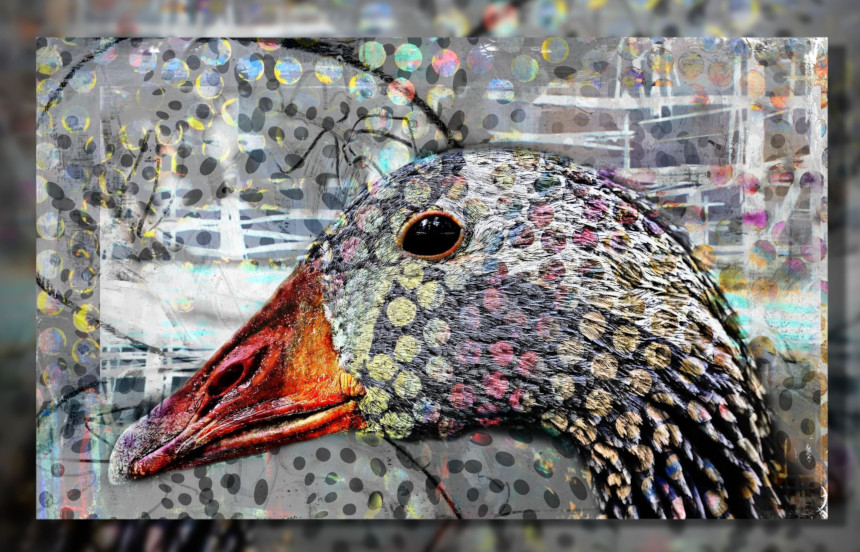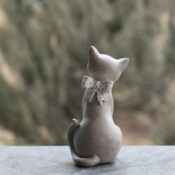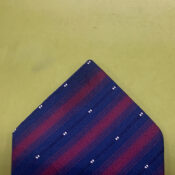“Isn’t she a beauty?” my sister said for the 77th time. Or so it seemed.
It was Connie’s 13th birthday, and she was admiring her “new” bicycle. A spring growth spurt had left her first two-wheeler behind, and she had spent the summer begging for a new bike. My older sister was deaf to reasons why the brand-new blue bike at Barr’s department store could not be hers. Connie’s self-absorbed mind could not fathom the reality of a family of seven living on a concrete block worker’s salary in the late 1960s. All she knew was she had to have a new bike and it had to be blue.
Like most fathers at that time, my dad could be quite resourceful. My older brothers Steve and Tommy were convinced Dad could do anything once he put his mind to it. Three weeks before Connie’s birthday, Dad had come home with something that resembled a bicycle in the trunk of the car, saved from rusting into oblivion at the county dump.
I became his partner. My job was to keep Connie out of the garage while he tinkered away. Miraculously, the fenders, spokes, gears, and chain took on new life. The morning before the big day, I carefully applied the fresh sky-blue paint while Dad added grips with blue and white tassels to the handlebars. My green-eyed monster was quelled for a brief time when my father motioned to Connie’s rejected bike in a far corner and said, “We’ll work on that one for you next week.”
Listening to Connie’s joy now was slowing reviving the monster. I fought it back as best I could, envisioning her old bike with a fresh coat of red paint. Meanwhile, Dad was getting a neck-breaking squeeze from her and I got a begrudging grimace when he said, “What do you say to Mary for helping?” I guessed it bothered her that her 10-year-old sister had succeeded in keeping the project a secret. She usually pinched secrets out of me. Secrets were seldom important enough for me to endure her pinching, so I was relieved I hadn’t been tested on this one.
“Well, go show it off,” Momma said as she handed her the county newspaper. Gravel flew as Connie sped out of our driveway and into the road for the half-mile trek to Pappy and Grandma’s farm. It was our job to see that Pappy got the paper after the family was finished with it. It was an errand I looked forward to because next to Momma and Dad, Grandma and Pappy were my favorite people in the world. And at Grandma’s there were always freshly baked sorghum cookies.
“Aren’t you going with her, Shorty?” I was usually fond of Dad’s nickname, but today for some reason it stung. I shrugged and started off in the dust left by my sister and the sky-blue bike.
Connie would have been surprised to know how much I looked up to her. She was everything I struggled to be. Momma said she wished Connie was more of a lady, but I secretly admired her. She didn’t take anything from anybody. She never went looking for a fight, but she never lost one that came to her. My brothers would even let her be a cowboy while I was always the cattle rustler. By the time they tied me to the big oak for the third time, I was ready to go back home and help Momma with the baby. Changing Kathy’s diapers was better than humiliation at the hands of Calamity Jane and the Cartwright brothers.
“Hey, whatcha so mopey about?” Connie had ridden back to me, impatient with my lagging behind. It had not occurred to her that I might be jealous. Or if it had, she wasn’t going to let on. When I didn’t answer, she said, “Say, your leg’s looking pretty bad. I don’t know why you let that Suzy Jenkins get the best of you.”
I could feel my face go hot as I bit my lower lip. I glanced down at the purple bruise two inches below my Bermuda shorts.
“You know what I’d do to her, don’tcha? I’d wallop her good so’s she land that sissy dress of hers right in the biggest mud puddle on the playground.”
I listened as my courageous sister rambled on about defending my honor. Two days earlier, I had received my first kick. I had been holding Brad Hickman’s hand in Red Rover and Suzy was being sent over. Just as she got to our tightly held hands, Brad let go. Squealing like a newborn pig, Suzy tried to stop her slide into a newly formed mud puddle from an early morning rain. Her skirt flew up over her head as water and muck drenched her. After struggling to her feet and hearing the whoops of laughter, she marched over and landed a muddy patent leather on my shin. She wouldn’t allow herself to suspect Brad, having a crush on him and failing to believe he would make a fool of her. Then, the next day at recess, she kicked me again, “Just for spite!”
“You just need to learn to stick up for yourself,” Connie threw over her shoulder as she picked up speed. Forgetting the bruises on my shin, I began to run. I wanted Connie to think that my leg didn’t ache as much as it really did. Abruptly, Connie stopped and, with her eyebrows pointed toward her nose, stared at me as I caught up.
“What’s wrong?” I asked, trying to hide how hard I was breathing. It was rare that Connie ever took time to look so serious. Her gaze shifted off into the distance. Then quietly she said, “It’s just sometimes I wish I could be more like you. Not always jumping in and hitting back. I know that would please Momma.”
She got off her bike and began to walk, putting the bike between us. There was silence as what she had said sank in. I never thought my sister would want to be anything like me. Then, with an exaggerated gasp and widening eyes, Connie squeaked, “Just as long as I’m not as short as you!”
We both began to giggle at her familiar Gidget routine while I pondered the eternal question of “will I ever be taller?” Momma said I would grow “in due time” and “not to worry about something so unimportant.”
So, I didn’t. After all, my stature provided nicknames from my family that offered a peculiar sense of security. But Connie saw my shortness as a fault that only she could compensate for when the going got rough. Just as it was about to that morning.
We had just reached the edge of Pappy’s property when we saw the enemy approaching. The gray gander was sneaking toward us, wings just beginning to spread as an odd hissing sound began to climb out his open beak. The hair stood up on the back of my neck as I watched the silvery gray and white feathers begin to tremble and flutter. Fear paralyzed me as the hissing became ominous. Then Connie was pushing the bike and newspaper at me.
“You ride up to the house while I distract him. You’re not big enough to outrun him.”
With no time to protest, I straddled the bike, gripping the paper between my left hand and a blue tasseled handlebar, and sucked in my breath as Connie gave me a starting shove. Panicking, I realized my short legs were a problem. I belatedly wondered if my luck might have been better at outrunning the angry fowl. Somehow my feet and bike pedals connected. As I started toward the house, I glanced back just long enough to see Connie headed toward the barn with the gander clipping at her heels.
Suddenly, the world turned upside down. The front wheel met the large gravel of the driveway and the bike and I parted company. The ground met my bruised shin and a cry of pain escaped. That was Connie’s undoing.
Connie stopped to assess my situation. The goose seized the opportunity to attach himself to my sister’s right leg. The scream was loud enough for the whole county to hear. The entire barnyard was startled, including the gander, who let go. Connie began to run in circles amidst flying dust, dandelion seeds, and feathers. As I struggled to my feet, I knew in my soul that fowl was not going to give up the chase. Connie’s scream had infuriated the bird, making him more determined for a taste of blood.
It was then I recalled a Calamity Jane and Cartwright brothers’ escapade where I had eluded my siblings by running into a cornfield. Dad had often warned us not to do it because we could become disoriented and not find our way back. As evidence, he cited the number of kittens that failed to return after their mothers had taken them for their first hunting lesson. Unlike a squalling kitten, I had made it back and lost my pursuers. But maybe one could lose a mean old gander in the maze.
“Connie! The cornfield!” I yelled, hoping that in her desperation she might for once heed the advice of her little sister. Fear outweighing pride, Connie veered into the cornfield, the gander hissing and honking right after her. I ran to the front porch, bumping headlong into Grandma, who was wiping her flour-covered hand on her bib apron. The unmistakable aroma of sorghum had followed her out the door.
Grandma grabbed me long enough to steady me and take a quick assessment of my blood-streaked leg. Then she turned toward the barnyard. “Pappy!” she yelled, not breaking her stride. She was heading out to the shed by the chicken coop.
“But Grandma, Connie’s over there in …”
“I know,” she said. “Go get your Pappy. He’s in the hayloft.”
I ran to the barn. Pappy was in the habit of catching a little shut-eye after the morning and afternoon chores. Already spent, I wasn’t sure I had the strength to climb to the loft, but the commotion had awakened Pappy and he was already coming down the ladder.
“Hello, Mary,” he said as he brushed past me. “Ever taste goose before?” My mouth dropped open as I heard him chuckle under his breath.
In the meantime, Connie, still shrieking, had worked her way through the corn to the area closest to the back of the house. I followed Pappy, who was following Grandma. I shuddered when I saw what was in Grandma’s hand. The ax normally appeared only on “hens-to-market” day, which was still a few weeks away.
We stopped at the edge of the field. The three of us listened to get an idea where the gander and his quarry might be. The sound of my sister screaming and clawing her way through the corn reminded me of a panic-stricken heifer.
Grandma turned to Pappy and I caught a subtle nod of his head. A silent agreement passed between them and I knew that what was supposed to be our Thanksgiving goose was going to be a birthday dinner for my sister.
Grandma had had enough. They had never raised a goose before. It had arrived as a bundle of down in the early spring from a neighbor’s flock but had quickly grown into an ill-tempered, bad-mannered, 30-pound featherweight. Just the week before it had attacked the mailman bringing a package to the door. The gander had chased the man back to his car and there had been no mail delivered for two days. Dad had been a victim along with his best Sunday pants. There had been other close calls, but this was different. This was Connie. Grandma loved all her grandkids, but she and Connie had something special. Momma called it a kindred spirit.
“Connie! Come on out this way,” Pappy hollered. He cheered her on, giving her a compass for her escape. Connie finally appeared, the gray menace right behind her, honking and hissing like the devil himself.
Red-faced and crying, Connie struggled to claw at her corn-scratched arms as Pappy held her tight. Grandma pounced and feathers flew as the gander honked his protest. Holding the bird firmly under her left arm, as I had seen her so often do with the chickens, Grandma and the goose headed toward the shed. The legends of Grandma’s wielding ability with the ax came flooding into my head, finding their way into my stomach. The nausea set in as I realized that would be the last I would see of the soft gray and white feathers on the outstretched wings of Pappy’s goose.
“Come on in the house so I can tend the battle wounds,” Pappy said. I detected a hint of sadness in his voice. If Pappy had a flaw it was his compassion for God’s creatures. He loved them all. It was a difficult flaw to have as a farmer who raised livestock to sell or to feed the family. Pappy could pet the 400-pound bull while no one else could be in the same field with the animal. The cows would eat hay out of his hand and the sheep would run to greet him. It was either my youth or my genes that gave me the same flaw. Momma would have called it a kindred spirit. I brought him sick kittens and wounded sparrows to nurse back to health. But the hardest was when the livestock left the farm for the market. On those days, Pappy and I shared a quiet melancholy.
I nibbled at a sorghum cookie in silence as Pappy applied Merthiolate and bandages to my wounds. Connie was at the sink, scrubbing her arms in oatmeal water. I tried to listen for Grandma returning to the house but gave up as Connie loudly relived her “goose chase.” Terror forgotten, she claimed victory over the fallen enemy.
“Guess you can invite your folks down to dinner tonight,” Pappy said. “There’ll be plenty to eat.”
That did it. Tears fell and Pappy took me in his lap and gave me his handkerchief. “Now there, don’t fuss. That’s why we got the goose in the first place, for good eatin’. It’s just a little sooner than we figured.” He squeezed me tight and added, “I love you young’uns too much to have you scared and all banged up every time you bring me my paper.”
“Oh my, I forgot the paper.” I jumped down from Pappy’s lap and lit out the door. I ran over and picked up the bike and dust-covered newspaper. Cautiously, I stole a glance out over toward the chicken coop wondering what was taking grandma so long.
She was standing very still looking out over the west field. After leaving the bicycle at the porch, I slowly walked out to her. My strong courageous Grandma, my sister’s kindred spirit, stood with tear-stained cheeks. I could not remember the last time I had seen my Grandma cry. As was my custom when Grandma got all quiet, I gently pushed my hand into her apron pocket to find hers. She gave my hand a squeeze and sighed. I looked up into her eyes. Grandma never cried over an animal. Especially one that was considered “livestock.”
“Your Pappy loved that bird.”
“Pappy loves all the animals,” I offered quietly. Then, wanting to somehow comfort her and myself, to let us both know it was all right, I added in my feeble 10-year-old voice, “He says it’ll be good eatin’.”
She smiled, keeping her eyes on the western sky. “You know,” she laughed, “I’ve never seen that sister of yours so scared in all her life.” Then she finally looked at me and I caught a glimpse of my sister Connie. “Guess maybe you’re wearing off on her, Little Bit.” She gave me a side-shoulder hug, took the newspaper, and turned back toward the house.
“Go fetch the family for dinner. We’ve got a birthday to celebrate.”
I watched Grandma walk past Connie’s bike on her way into the house where she was loudly greeted by my sister replaying anew the barnyard chase. That bike looked like it needed a rider. I knew I would catch holy heck from my sister and probably face another roping by Calamity Jane and the Cartwright boys as I mounted the steed and pointed it toward the homestead to “fetch the family for dinner.” But I figured it was worth the risk.
Featured image: OneSmallSquare /Shutterstock
Become a Saturday Evening Post member and enjoy unlimited access. Subscribe now




Comments
What a lovely gem of a story this is, Ms. Kaiser. A little slice of country life from long ago, but still relatable today. Sibling rivalry, not wanting any harm to come to animals to name two. Poor Pappy’s hand was forced to make a painful, premature decision in the case of his unfortunately very nasty goose. (The attorney’s son in me would definitely see the goose as a lawsuit waiting to happen in the present, though less so in the late ’60s.)
I like the authentic, conversational style in which you write between the characters, and their relationships with one another. I enjoyed the part of female bully Suzy Jenkins being taught a lesson. Also the fact the two sisters had such a great bond with their grandparents. Hopefully they grew to have one with each other lasting into the present; with something actually good coming from that scary day by Pappy’s goose.